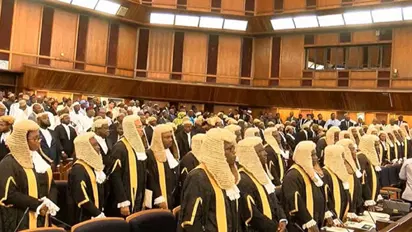By Aaior K. Comfort
In an insightful interview with Vanguard’s Law & Human Rights, Chief Mike Ahamba, SAN, a prominent member of the inner bar, delves into the challenges faced by judges in Nigeria, particularly focusing on a constitutional provision that limits their career options after leaving the bench. This provision, outlined in Section 292 of the 1999 Constitution, prohibits any individual who has held office as a judicial officer from practicing law after resigning, retiring, or being dismissed.
The Impact of Section 292
Ahamba describes this clause as a “Sword of Damocles” hanging over judges, instilling fear and prompting them to remain in office rather than risk their livelihoods. He emphasizes that this fear leads to timidity and compliance with the executive, significantly affecting the quality of justice delivered in Nigeria. According to him, the provision has its roots in the military regime, aimed at preventing judicial officers from acting independently against government interests.
He reflects on historical events, such as the removal of Chief Justice Dr. Taslim Olawale Elias in 1976 and other judges, who faced dismissal due to their judgments being viewed as anti-government. These actions marked a decline in the quality of legal professionals willing to join the judiciary, negatively impacting the integrity of judicial decisions.
Judicial Independence and Timidity
Ahamba argues that the constitutional provision creates a climate of fear among judges, who may feel compelled to align their decisions with governmental expectations to retain their positions. He asserts that if judges had the option to return to legal practice after resigning or being dismissed for principled reasons, they would be more likely to uphold their integrity and make independent decisions without the fear of repercussion.
He highlights the psychological toll of this provision, suggesting that it may contribute to the premature deaths of some judges post-retirement. Judges, fearing the loss of their status and pension benefits, might choose to comply with pressures rather than risk their positions, leading to a decline in the independence of the judiciary.
Recommendations for Reform
Ahamba advocates for an amendment to the constitutional provision, suggesting that it should only apply to judges dismissed for corrupt practices or violations of judicial conduct. He believes this change would empower judges to act independently, knowing they can return to legal practice if they choose to resign for principled reasons. He emphasizes that the National Assembly holds the power to make this amendment, which would bolster judicial independence and enhance the quality of justice in Nigeria.
Ahamba’s perspective raises critical questions about the current state of judicial independence in Nigeria and underscores the urgent need for reforms to protect judges from political pressures. By enabling judges to maintain their legal careers after serving on the bench, the legal system could foster a more independent and robust judiciary.
On the Role of Retired Judges
Regarding the role of retired judges, Ahamba asserts that it is acceptable for them to engage in consultancy or academic positions, provided they do not directly participate in court proceedings. He warns against potential conflicts of interest when retired judges are involved in cases, emphasizing the importance of maintaining ethical standards in the legal profession.
Conclusion
Chief Mike Ahamba’s insights shed light on the systemic issues within Nigeria’s judiciary. His call for reform highlights the need to create an environment that encourages judicial independence and integrity, crucial for the advancement of democracy and justice in Nigeria.

